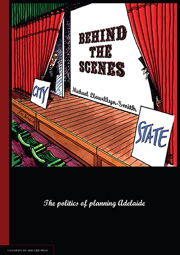Book contents
- Frontmatter
- Contents
- List of Figures and Tables
- Abbreviations
- Acknowledgements
- Foreword
- Introduction
- 1 The background to the founding of Adelaide and South Australia in 1836
- 2 The development of the City and State from 1840 until 1950 and the City/State relationship during this period
- 3 Changing attitudes to planning the City and State from 1950 until 1972
- 4 The establishment of the City of Adelaide Development Committee and the introduction of Interim Development Control
- 5 Planning in Sydney and the work of George Clarke
- 6 The City of Adelaide Planning Study
- 7 Converting the City of Adelaide Planning Study into a City Plan
- 8 An innovative system of city planning from 1 March 1977
- 9 Changes in the ACC and the State, and the first Heritage Study of the City
- 10 The operation of the City's planning system from November 1982 until May 1987
- 11 The Condous Lord Mayoralty and the declining importance of the City of Adelaide Planning Commission
- 12 The State Planning Review, the last City Plan and the end of the City's separate system
- Conclusion
- Appendix 1 Key People of Influence identified as potential interviewees
- Appendix 2 Heritage Summary Assessment Sheet
- Bibliography
- Index
6 - The City of Adelaide Planning Study
Published online by Cambridge University Press: 05 June 2013
- Frontmatter
- Contents
- List of Figures and Tables
- Abbreviations
- Acknowledgements
- Foreword
- Introduction
- 1 The background to the founding of Adelaide and South Australia in 1836
- 2 The development of the City and State from 1840 until 1950 and the City/State relationship during this period
- 3 Changing attitudes to planning the City and State from 1950 until 1972
- 4 The establishment of the City of Adelaide Development Committee and the introduction of Interim Development Control
- 5 Planning in Sydney and the work of George Clarke
- 6 The City of Adelaide Planning Study
- 7 Converting the City of Adelaide Planning Study into a City Plan
- 8 An innovative system of city planning from 1 March 1977
- 9 Changes in the ACC and the State, and the first Heritage Study of the City
- 10 The operation of the City's planning system from November 1982 until May 1987
- 11 The Condous Lord Mayoralty and the declining importance of the City of Adelaide Planning Commission
- 12 The State Planning Review, the last City Plan and the end of the City's separate system
- Conclusion
- Appendix 1 Key People of Influence identified as potential interviewees
- Appendix 2 Heritage Summary Assessment Sheet
- Bibliography
- Index
Summary
CHOOSING A CONSULTANT FOR THE PLANNING STUDY
There is considerable political background to the choice of George Clarke & Urban Systems Corporation (USC) as the consultants to prepare the City of Adelaide Planning Study. For example, Clarke attended the RAPI Conference in Brisbane in September 1972 and met with Premier Don Dunstan when Dunstan was critical of the SPA and advised that he was considering a different planning approach for Adelaide.
Darrel Conybeare was working in the Sydney office of USC when the ACC was seeking consultants for the Adelaide Planning Study. Clarke gave Conybeare the job of going to Adelaide to talk to Hugh Stretton as Conybeare's father was a close friend of Professor George Duncan at the University of Adelaide's History Department where Stretton was based. Conybeare and Stretton had many discussions, and Conybeare gained some very useful insights in terms of pitching the response to the consultant brief. Stretton's influence is clear, as he advised Conybeare to address three issues. First, the importance of housing, especially low cost housing as provided by the SAHT. Second, the importance of the Park Lands and how to minimise the inroads into them by eliminating unnecessary pathways and roads to create larger broad sweeps of open Park Lands. Third, there was a need to reinforce the heritage of Light's plan for Adelaide.
- Type
- Chapter
- Information
- Behind the ScenesThe politics of planning Adelaide, pp. 155 - 196Publisher: The University of Adelaide PressPrint publication year: 2012



